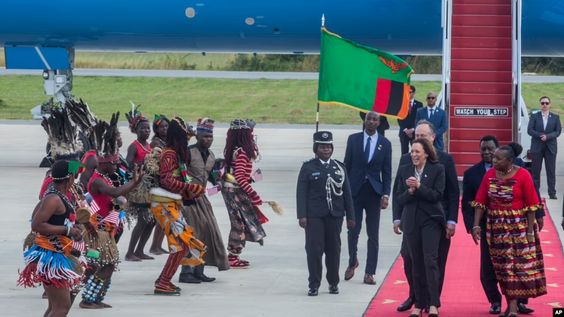Africa
Harris Visits Zambian Farm While Considering Climate Change

In order to highlight measures to safeguard food supply in the face of climate change, Vice President Kamala Harris on Saturday visited a farm outside the capital of Zambia that is increasing its vegetable harvest using modern methods and technology.
She walked passed rows of peppers and looked at a drip irrigation system before stating, “It’s an example of what can be done around the world.”
The emphasis on boosting access to food is more prominent in Africa than it is in the United States, where discussions on climate change often centre on substituting clean energy for fossil fuels. Poor nations have suffered from rising prices as a result of Russia’s invasion of Ukraine, and in the years to come, global warming is predicted to provide even greater difficulties.
Conflict and migration may result from hunger-related instability.
The link between these concerns, according to Harris, is fairly obvious.
She is advocating for $7 billion in investments from the business sector, mostly to increase conservation and enhance food production, to assist Africa get ready for the consequences of climate change. She revealed that objective while she was completing a week-long trip to Africa that had already included visits in Tanzania and Ghana. The goal of the trip was to boost US attempts to erode China’s hold over a region of the world.
The most expensive thing that Harris has outlined will require most work to implement.
In order to increase the scope of its conservation programme, African Parks, a nonprofit organisation, has pledged to raise $1.25 billion over the following seven years. One Acre Fund, a different group, aims to gather $100 million by the end of the decade in order to plant 1 billion trees.
Although Africa has contributed far less to global greenhouse gas emissions than wealthier regions of the globe like the United States, the politics of climate change are complex in this continent. The International Energy Agency estimates that 43% of Africans would not have access to power in 2021, and recent interruptions have irritated residents.
Harris was questioned on how the West can demand that Africa go green and stop utilising its natural resources in Ghana during a news conference. She was also questioned on the Paris Climate Accord’s pledge that wealthier nations will contribute $100 billion yearly to assist developing nations in coping with climate change.
The “clean energy economy,” according to Harris, offers prospects that might spur prosperity in Africa. She said it is “critically vital that, as global leaders, we all speak truth about the discrepancies that exist in terms of cause and effect and that we address those imbalances.”
In order to fulfil the country’s international obligations, President Joseph Biden has asked for $11 billion in his proposed budget.
Harris stated, “We’re waiting for Congress to go to work.”
